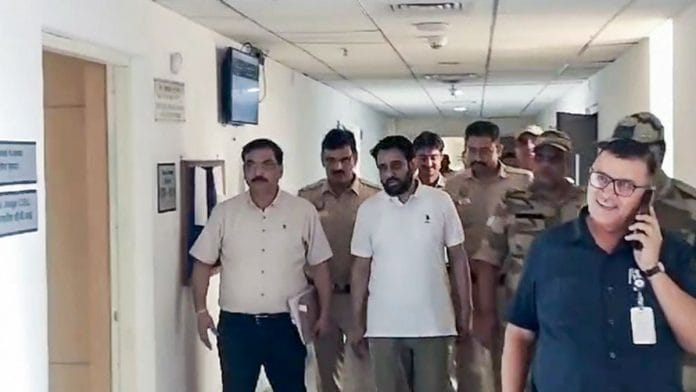New Delhi: A Delhi court Thursday refused to take cognisance of the Enforcement Directorate’s (ED’s) supplementary prosecution complaint (equivalent of a police chargesheet) against Aam Aadmi Party (AAP) MLA Amanatullah Khan in a money laundering case linked to the Delhi Waqf Board and ordered his release. This came a week after the Supreme Court held that prior government sanctions were necessary to prosecute public servants, even in money laundering cases.
Justice Jitendra Singh, the special CBI judge for MP/MLA cases at the Rouse Avenue Court, said that while the agency had brought on record statements of several witnesses which were “sufficient” to proceed under the provisions of the Prevention of Money Laundering Act (PMLA), it had not brought on record sanctions from the competent authority under Section 197(1) of the Code of Criminal Procedure (CrPc), or the corresponding Section 218 of Bharatiya Nagarik Suraksha Sanhita (BNSS)—as mandated by the top court last week.
The court also observed that since there were no sanctions to prosecute him, there was no legal ground to justify his further detention which otherwise would amount to “illegal” custody. It ordered his immediate release on bail bond of Rs 1 lakh and on condition of his availability in case the ED obtained legal sanctions to prosecute him.
The federal money laundering probe agency arrested Khan on 4 September, filing a supplementary prosecution complaint against his wife and him on 29 October. Khan’s arrest came eight months after ED filed its first prosecution complaint alleging irregularities in the appointments at the Delhi Waqf Board between 2016 and 2021 when Khan was the chairman. In its supplementary complaint, it accused Khan of benefiting from the proceeds of the crime.
Also Read: Why ED is claiming right to provisionally attach properties even without FIR under predicate offence
Ruling stems from SC judgment
Special judge Singh’s ruling stems from a Supreme Court judgment delivered last Wednesday. The top court was hearing ED’s plea challenging a Telangana High Court order quashing the agency’s case against two IAS officers, Bibhu Prasad Acharya and Adityanath Das, in the Andhra Pradesh government on the grounds that no prior government sanctions had been secured to prosecute them.
The duo had moved the high court arguing that under Section 197(1) of the CrPC, prior sanctions were mandatory for their prosecution because they were public servants.
The Supreme Court bench of Justices Abhay S. Oka and Augustine George Masih ruled that Section 65 of the PMLA makes the CrPC provision applicable to all proceedings under the anti-money laundering law.
“Considering the object of Section 197(1) of the CrPC, its applicability cannot be excluded unless there is any provision in the PMLA which is inconsistent with Section 197(1). No such provision has been pointed out to us. Therefore, we hold that the provisions of Section 197(1) of CrPC are applicable to a complaint under Section 44(1)(b) of the PMLA,” the judgment said.
Reiterating the observations made by the apex court, special judge Singh observed that Amanatullah Khan was a public servant and the alleged offence was committed during the course of his duties.
“That the scrutiny of the seized materials revealed that Shri Amanatullah Khan has acquired huge cash amounts being the proceeds of crime out of his corrupt and illegal activities relating to illegal recruitment of the persons in Delhi Waqf Board, leasing out the properties of Delhi Waqf Board in unfair & illegal manner and misappropriation of Delhi Waqf Board funds etc. while being the public servant i.e. Chairman of Delhi Waqf Board and MLA from Okhla Legislative Assembly of Delhi during the period from 2016 onwards and thereafter invested he invested his ill-gotten money in the immovable properties through his associates Shri Zeeshan Haider, Daud Nasir and others,” the judgment noted, quoting the prosecution complaint.
Justice Singh observed that the case against Khan required sanctions from the competent authority.
“Apparently, as per allegations, made in the complaint, A-6 who is, indisputably, a public servant by virtue of him being Chairman of Delhi Waqf Board is alleged to have committed the offences while he was discharging his official duties,” the order stated.
“In the overall circumstances, it is not wrong to say that A-6 has attracted the bar contained in Section 197 of the Cr.P.C. {which corresponds to Section 218 of Bhartiya Nagarik Suraksha Sanhita, 2023…i.e. sanction by the competent Government is must in this case in order to take cognizance for the offence punishable u/s 4 of the PMLA against A-6,” it added.
(Edited by Sanya Mathur)
Also Read: ‘Can appeal acquittal in predicate offence’. How Madras HC ruling in Lottery King’s case empowers ED






